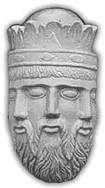jriccitelli wrote:You seemed to think 1 John 5 was not speaking of Jesus, your quote says they do or do not. Are you saying you do not know then? Why post a piece from biblicalunitarian.com that argues that God is the true God, and not Jesus here, If you don't know yourself?
Hi JR,
I truly desire to have a meaningful and edifying dialogue with everyone here, but what often happens is that we (in general) speak past each other, or we have differing definitions for words, or as in this case, assumptions are made without noticing was was actually said or not said. Consequently a lot of time and effort is wasted afterwards in just trying to clear things up.
Look at what I actually said.
Hi Homer, this is from biblicalunitarian.com
From that, you came out on the offensive saying "Since you know who's being talked about in John, tell me, who's being talked about in....1 John 2:3-6, 1 John 2:26-29, 1 John 4:11-16?"
I thought to myself, hold on, did I say that I knew anything? In this post here you said "You seemed to think that 1 John 5 was not talking about Jesus." Again, how did you get that I seemed to think anything from me saying, "Hi Homer, this is from...?" Can you see that you are making assumptions about what I know, without me having said anything?
Do I agree with the article? I think I do, but I haven't chewed on it long enough to know if I'm in full agreement with all of it or not. It's not like I posted it and said here's my creed, and I'm sticking to it.

Why did I post it? Because it was information directly related to the scripture that Homer had asked Paidion about. I posted it so it would be available to anyone interested in an explanation that they may not have been aware of. Homer or anyone else is free to look at it or ignore it. If someone cares to read it, they can decide for themselves if it makes a better case than the trinitarian explanation does.
jriccitelli wrote:I asked you, as a rebuttal to the piece, how can you know whom is who in each passage at all? Because at the end of the day they are completely intertwined and when speaking of one, we are often speaking of the other, unless you can tell me who is Him, or He, in each case, why are you making a case out of it?
As I see it, you're not really giving a rebuttal to the article, you're objecting to what you think I said in favor it. You also didn't deal with the verse in question, nor did you say anything about why you thought the explanation in the article was wrong.
jriccitelli wrote:I don't think John, or God, were unaware that it is almost impossible to tell One from the Other in many cases. But that is no problem, because they are one in the same, God. No problem!
I think there is a problem, or at the very least, two. There is an identity problem and a problem with definitions within trinitarianism.
To most trinitarians, the term "God" can be used to mean whomever they wish it to mean in any given passage without it really having a designated definition. For the trinity to work, God sometimes means Jesus, sometimes it's the Father, at other times it's both. Sometimes God means the trinity, and sometimes it refers to the essence, substance or "God-stuff." God has popularly been defined as 3 whos and 1 what. The trinity doctrine tries to hold on to monotheism by saying that the one God is the nature that the three "whos" share; the "what" is the object that defines monotheism. I object, God is not a what! Knowing God is not about knowing a substance. God is a father, not an "ousia."
There is a problem of identification also. I don't deny that some passages are challenging, but you believe that Jesus and God (by God here, you mean the father) most of the time, can't be identified one from the other, and that they are in fact, one in the same God. So you see, now when you say they are the same God, you're switching terms; you're not identifying them as the same being (because they're not), but as the same "substance." To sum up, in one instance you define God as the father, in the other you define God as an essence.
The trinity doctrine is that God IS three. From everlasting to everlasting, God is three. What that means to me is that every time we read the word Theos in the bible, we should be able to substitute it with the word trinity, because Theos just is a trinity. Are you willing to do that? Would you be willing to say, for example, "for the trinity so loved the world, that they begat and gave one of themselves, so that whoever believes in that only begotten one should not perish, but have eternal life?"

